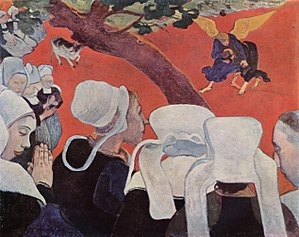
This is a weird painting, even by Gaugin's standards. I have a large high quality print of this framed and hanging in my study. As Old Testament stories go, the encounter of Jacob with a man, or an angel of the Lord, or the Lord, is amongst the spookiest stories in the Bible. Mystery, menace, ambiguity, human destiny and divine purpose, accumulated guilt and anxiety at critical point, can all legitimately be read into the picture; they are all rooted in the Jacob text narrative. And the agony goes on all night, and the outcome is uncertain, but when it comes is decisive, and leaves Jacob forever changed.
In this painting, called "Vision of the Sermon. Jacob Wrestling with the Angel", Gauguin captures the eerie dream world of spiritual vision, prayer and the human struggle for meaning, purpose, fulfilment. The vision is born of prayer, shown in the intense concentration of the faces in profile, the hands pressed together, and the central figure facing the relatively small figures in the distance, where Jacob is either enfolded by the angel wings or is caught in the talons of a bird of prey. The painting is psychological drama and spiritual crisis surrounded by a praying community. Gauguin's own inner torment is woven into the pigment of this painting.
Charles Wesley's hymn, "Come, O Thou Traveller Unknown" has 14 original verses, and is abbreviated in later Hymnals. The drama of spiritual conflict has turned into a personal argument. Jacob is no longer a victim but a protagonist; he knows perfectly well who he is, after all God gave him his name. But who is the visitor? In Wesley's hymn Jacob is the Christian struggling with all that baggage of guilt, anxiety and life's contingencies. He suspects, and is desperate to name the One who comes with the indescribable love of the crucified for the sinner. It is a hymn telling the narrative of Christian appropriation of a grace that comes to meet us at the point of ultimate crisis.
For Wesley the story of Jacob and the angel is one of theological discovery and life re-orientation. So in Wesley's verses the reader and singer are drawn into the psychological processes of a human heart and spirit and mind, wrestling with the reality of God and determined and desperate for an answer. Is God love or not? Can he expect mercy or judgement? It is one of Charles Wesley's reverent games to play with the reader; we know where this is going. The hymn is a catena of clues, but the tension builds.
In vain thou strugglest to get free;
I never will unloose my hold:
Art thou the Man that died for me
The secret of thy love unfold:
Wrestling, I will not let thee go,
Till I thy name thy nature know.
In that eerie darkness at Jabbok, Jacob is encountering the crucified saviour, the presence of God embodied but beyond naming, until God himself declares it to the heart. Here, in a hymn based on one of the pardigmatic stories of the Bible, is a robust doctrine of Christian assurance, the distilled essence of Wesleyan Arminian theology. God is love. Pure, universal love. No more argument, now he knows!
Leave a Reply